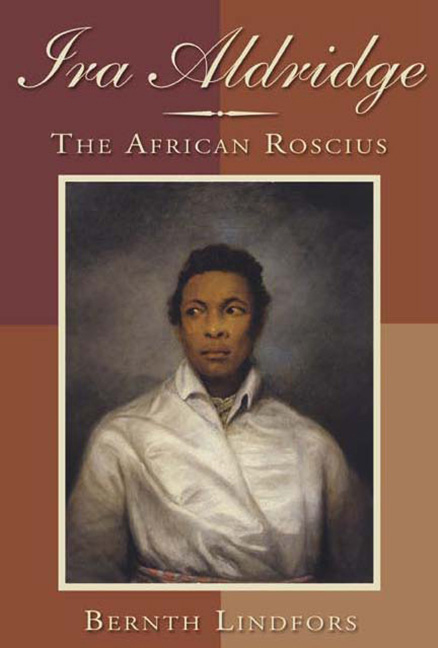Book contents
- Frontmatter
- Miscellaneous Frontmatter
- Contents
- List of Illustrations
- Acknowledgments
- Introduction
- Part One: The Life
- Part Two: The Career
- 8 Ira Aldridge's Fight for Equality
- 9 Ira Aldridge in Manchester
- 10 Acting Black: Othello, Othello Burlesques, and the Performance of Blackness
- 11 Ira Aldridge: Shakespeare and Minstrelsy
- 12 “Mislike me not for my complexion … “: Ira Aldridge in Whiteface
- 13 Ira Aldridge as Macbeth and King Lear
- 14 Creating the Black Hero: Ira Aldridge's The Black Doctor
- 15 The First American on the Zagreb Stage
- 16 A Heartwarming, Radiant Othello in the Netherlands, 1855
- 17 Ira Aldridge's Performances in Meiningen
- 18 “Othello's Occupation's Gone!” The African Roscius in Poland, 1853–67
- Notes on Contributors
- Index
- Miscellaneous Endmatter
8 - Ira Aldridge's Fight for Equality
from Part Two: The Career
Published online by Cambridge University Press: 26 October 2017
- Frontmatter
- Miscellaneous Frontmatter
- Contents
- List of Illustrations
- Acknowledgments
- Introduction
- Part One: The Life
- Part Two: The Career
- 8 Ira Aldridge's Fight for Equality
- 9 Ira Aldridge in Manchester
- 10 Acting Black: Othello, Othello Burlesques, and the Performance of Blackness
- 11 Ira Aldridge: Shakespeare and Minstrelsy
- 12 “Mislike me not for my complexion … “: Ira Aldridge in Whiteface
- 13 Ira Aldridge as Macbeth and King Lear
- 14 Creating the Black Hero: Ira Aldridge's The Black Doctor
- 15 The First American on the Zagreb Stage
- 16 A Heartwarming, Radiant Othello in the Netherlands, 1855
- 17 Ira Aldridge's Performances in Meiningen
- 18 “Othello's Occupation's Gone!” The African Roscius in Poland, 1853–67
- Notes on Contributors
- Index
- Miscellaneous Endmatter
Summary
In the mid-1820s, the campaign against slavery in England was coming to its height, even as, at the behest of wealthy proslavery interests, black inferiority was widely propagandized. The debate was carried on in Parliament, in the press, in public meetings, in local newsletters, and in the expressions of popular culture— including the theater. In America, ongoing resistance to slavery erupted most notably in the south in 1822 in a planned wide-scale revolt under Denmark Vesey. In the north, it would be another five years before a state like New York passed the last in a series of manumission acts, though a raft of discriminatory measures aimed at black subordination kept such liberation in check. It is no coincidence that such measures came to be known collectively as “Jim Crow,” for that eyerolling, shoe-shuffling, fast-talking, singing and dancing white parody of black mores, introduced by the actor “Daddy” Rice, began its cultural takeover of American audiences at around the same time, the late 1820s. Rice/Crow soon became a hit in the large popular Park Theatre of New York, with its rumbustious— and segregated—working-class audience (blacks were confined to the galleries).
Yet some years earlier, New York had been the site of a much braver cultural venture, the African Theatre. Created by free blacks around 1820, it was closed down a few years later following a white riot. It emerged again, but its existence was fragile and uncertain and it did not long survive the climate of racist hostility that surrounded it. One of those who may have appeared there and whose imagination was certainly fired by it—and perhaps also by having witnessed the great English actor Edmund Kean in New York—was the young Ira Aldridge, the son of a black minister. Although destined for the ministry, Ira rejected this path, choosing to pursue a vocation as an actor. But only in England was this even remotely possible. Hence, at the age of seventeen, in 1824 or 1825, he came to England, never returning to his native land, though he went on to perform extensively across Continental Europe. Aldridge's career in Britain and Europe spanned some forty or so years, from his first performance at the Royalty Theatre to his last performance in England at the Theatre Royal Haymarket, 1865.
- Type
- Chapter
- Information
- Ira AldridgeThe African Roscius, pp. 97 - 125Publisher: Boydell & BrewerPrint publication year: 2007

